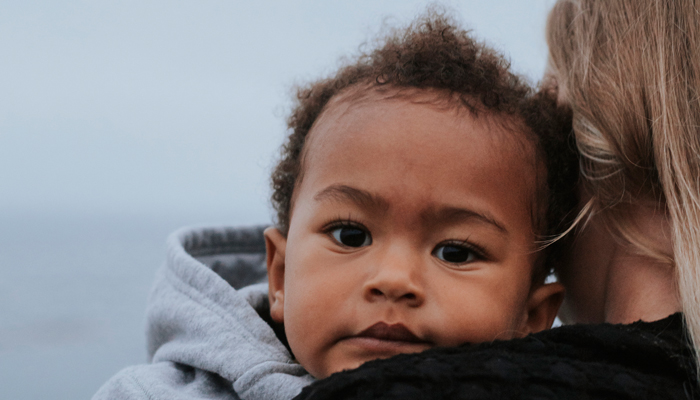It started innocently enough. Just a little chit-chat between two moms at the bookstore story time, an exchange of our children’s ages and names. Then she leaned in close to Matthew, who gave her a gummy grin and grasped her outstretched finger with his pudgy, cocoa-colored hand. “Well, look at you!” she cooed. “Aren’t you lucky? You were saved.” I lifted Matthew into my arms, speechless, a brittle smile frozen on my face.
Later, I thought of all the ways I could have responded. I fantasized about sardonic retorts, mostly referencing whales or pennies. I confided my outrage to a few friends during a play date. They listened, waiting patiently to hear the insult that had me so incensed. When I told them, I was met with silence.
Finally, one brave friend said, “I don’t get what you’re upset about. I mean, you did save him! Just think about what might have happened if he was still with his birth mother.”
I countered, “His birth mother, from everything we know of her, is a kind and loving woman.”
“OK, maybe he wasn’t saved,” my friend conceded. “But what about all those babies born to teenagers? Drug users? Women with so many kids, there’s no room for one more?” My protests sounded weak and whiny, even to my own ears.
I mulled it over for days afterward. Why couldn’t I express why I was so offended that someone used the word “saved” to describe my son? Neurotically, I turned to the dictionary and found “save” defined as “to rescue from danger or possible harm, injury, or loss.” Rescued from loss? Finally, I was able to articulate my feelings.
As an adoptee, Matthew lost the opportunity to grow up in a family that looks like him. He has also lost the stories of his gestation and birth. He has lost the chance to go to story time with his mom without attracting stares, as stealthy as they may be. Calling him “saved” ignores the fact that his birth mother made a very difficult decision — that adoption changed his life in many ways, not all of them positive.
Matthew is not merely the beneficiary of my selfless charity work. He will grow up knowing that his birth mom loved him so completely that she chose pain and loss for herself to do for him what she thought was best. If one of Matthew’s parents has behaved selflessly, it wasn’t me.
Saying Matthew was “saved” implies doubt about his desirability, his worthiness to be adopted. “After all, you didn’t have to take in this baby,” is the unspoken message. More than once, I’ve been given a list of my merits — young, married, educated, middle class — followed by the observation that I surely “could’ve gotten a white baby,” as if we had ordered Matthew from a catalog. We chose transracial adoption because we felt that we had the family and community resources to parent a child of another race. We didn’t feel sorry for our son. We don’t expect him to be grateful that we “chose him.”
So where has my obsessing about this word gotten me? That’s debatable. Had I spouted my objections to the mommy at story time, I doubt that I would have changed the way she thinks of my family and of adoption. I can imagine her, shocked and chastised, making a mental note not to sit near the crazy lady next time. But I know I’ve gained something from this verbal autopsy. I have new confidence in my definition of who Matthew is to me.
“Saving someone” happens in a moment, not a lifetime. It’s jumping into choppy water or in front of a speeding train. The action is daring, but fleeting. Wiping a poopy bottom, bandaging a skinned knee, and cheering at the sideline aren’t acts of salvation, they are the acts of mothering. And mothering? That’s not fleeting. Excuse me for taking it personally, but he’s not “saved.” He’s my son.



